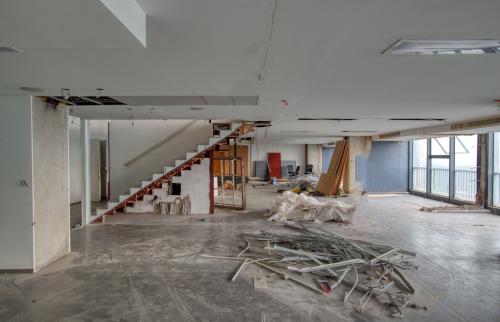Observers are lining up to credit the weekly satirical news show HBO’s Last Week Tonight and its acerbic host John Oliver with reversing the Federal Communications Commission’s decision on net neutrality. So I watched with interest as the show turned its gaze to the topic of the nation’s crumbling infrastructure: our dams and dikes, ports and pipes, roads and rails.
That it’s difficult to hold people’s attention when it comes to infrastructure was actually the running joke of the segment. It began with real Hollywood footage from summer blockbusters of fake exploding roads, runways, dams, and bridges. It ended with a tongue-in-check star-studded movie trailer about an alternative concept: maintaining that infrastructure before it falls down or becomes dangerous. (The clip featured what has to be the first-ever dramatic use of the line: “Lefty loosey, righty tighty.”)
But in between the show raised an important point: Why do we only care about infrastructure when a tragedy occurs? From fractured
water systems, to commuter rail accidents, to disintegrating bridges, to broken levees, one of the only times infrastructure gets any attention is when it fails. Unfortunately, due to lack of attention to basic maintenance and upkeep, there is concern that such problems are fated.
The other way infrastructure gets attention is when new things are built—especially roads. Oliver and his team probably overemphasized but perfectly skewered politicians’ attraction to oversized novelty scissors used to cut celebratory ribbons on top of virgin ribbons of asphalt. Lots of analyses show that in this country we do a great job building new stuff, but it’s the lack of attention as it ages that is our real problem.
And that leads to the other big problem addressed by the show. Because it’s not top of mind, leadership in Washington—both the executive and the legislature—is not enthusiastic about raising taxes to reinvest, especially the gas tax. One manifestation of this dilemma is that the federal highway trust fund, the primary source for road, bridge, and transit funding, is slated to run out of money at the end of May.
But while the show got all that right, it missed the mark by failing to recognize the diverse and highly fragmented ways that America selects, builds, maintains, operates, and pays for assets as different as public transit, telecommunications, and water. To be sure, for certain sectors federal spending is relatively high, such as transportation and water for which federal spending averaged $92.15 billion each year from 2000 to 2007. But even for those sectors, the federal share of total spending was never higher than 27 percent during that time. How choices are made about American infrastructure is exceedingly complex and depends on funding sources, jurisdictional concerns, and political negotiations.
So while some in Congress are tight-lipped about their ideas for reinvesting in infrastructure, it’s our cities and states, as well as the private and non-profit sectors, that are literally rebuilding this country from the bottom up. From gas tax increases in Iowa, to new partnerships on water in Bayonne, to new infrastructure institutions in Chicago, the nation is not waiting around for Washington to provide Americans with the reliable and modern infrastructure they need to build greater economic opportunity and create more and better jobs.
In the end, I know it’s just comedy, but when the topic of infrastructure gets any attention without a tragedy, it is certainly a good thing.
The Brookings Institution is committed to quality, independence, and impact.
We are supported by a diverse array of funders. In line with our values and policies, each Brookings publication represents the sole views of its author(s).



Commentary
America’s infrastructure woes are no joke: John Oliver takes on infrastructure
March 2, 2015